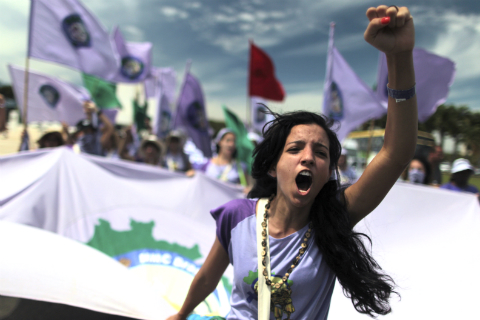Focus
Emerging unrest

© REUTERS/Ueslei Marcelino
Until now considered a model in terms of reducing poverty and inequality, Brazil has recently faced the wrath of hundreds of thousands of protesters from across all sections of society, riling up against inflation while calling for better access to health care, education and other public services. OECD analyst Horacio Levy explains.
Recent trends in poverty and inequality reduction in Brazil have been impressive. However, the starting point was so high that despite all the promising results there is still a long way to go. The protests highlight this. Despite all progress, there is no room for complacency. Brazil is still a very unequal country in which the vast majority of the population does not have access to public services of a reasonable quality, particularly health, education and transport. The unease with the government spending on the 2014 Football World Cup and the rise on bus fares shows that there is a strong demand for public resources to be better used and targeted to people’s needs.
Better access to better quality public services are the biggest challenges facing the emerging middle class. Despite their increased purchasing power, the emerging middle class finds it difficult (if not impossible) to enter the elite schools, universities and hospitals (public and private) that the upper middle class and the rich use. Having emerged to a middle class status, this part of the population now feels empowered to demand access to quality services.
The Brazilian government has recently been targeting more resources to areas mentioned in the protests. Education and health expenditure as a proportion of GDP have increased in the last decade, respectively from 3.9% to 5.6% and from 3% to 4%, according to World Bank estimates. However, the quality of services is still very deficient. Further resources and much better management to reduce inefficiency, waste and corruption, are now required.
Read more
- The picture in Brazil is not all gloom. Brazil has made progress in recent years in improving the quality of life of its citizens, as Brazilians are generally more satisfied with their lives than the OECD average. – OECD Better Life Index: Brazil
- A strong economy helped some 30 million Brazilians join the middle class over the past decade as national GDP grew continuously, despite the international crisis. Cesar Cunha Campos, Executive Director of the FGV Foundation, explores Brazilian optimism. – In Brazil, Better Lives
- The urban middle class youth is in revolt in Brazil, Turkey and other fast-growing countries. Protests may destabilise governments in the short term but could ultimately strengthen democracy, argues Helmut Reisen, former research head at the OECD Development Centre – Emerging Middle Class Blues
- Latin America’s middle class is dynamic but also vulnerable. The right mix of social and economic policies is essential to ensure it plays its traditional role of driving prosperity and underpinning stability, says the OECD Development Centre. – Latin American Economic Outlook 2011: How Middle-Class Is Latin America?
- Wealth is increasingly shifting to emerging economies, especially in Asia. By 2020, the region could account for half the world’s middle class, and their consumption patterns will be felt throughout the global economy, according to development expert Homi Kharas. – The Emerging Middle Class in Developing Countries
Related Documents